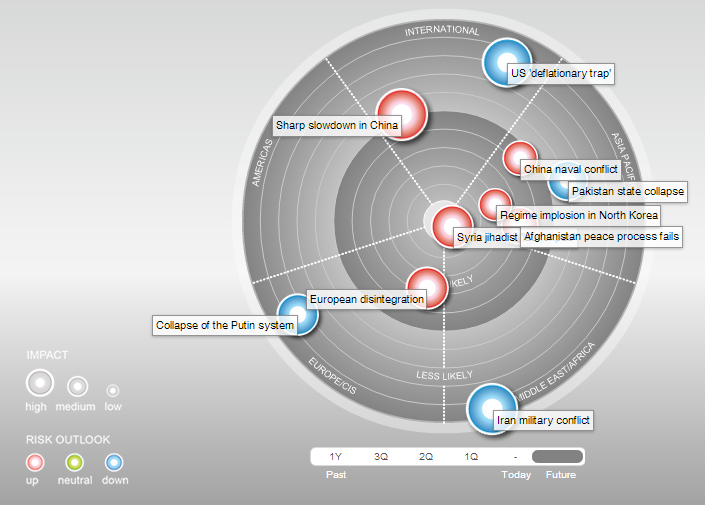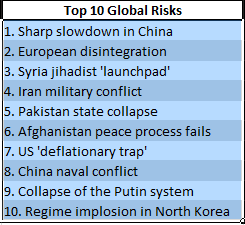With another new year upon us mortals, we thought it is time again to check out the top 10 global risks ranked by Oxford Analytica. Not surprisingly, from a geographical perspective, a majority of the top global risks come from the Middle East region (at 40%) and the Asia-Pacific region, specifically China, and North Korea (at 30%). U.S., Europe, and Russia round out the rest.
The ranking is mostly based on the potential size of global impact. However, putting them under the lens of probability, a different picture emerges (see graph below)
While the economic related risks such as a sharp slowdown in China, EU disintegration, and deflation in the U.S may rein supreme in terms of global impact, the probability of them materializing is actually less likely than the geopolitical risk in the Middle East (Syria, Iran, Pakistan and Afghanistan), and Asia (China, North Korea).
In terms of the type of risk, seven out of the top 10 risks are geopolitical, while only three are financial or economic. So if we look at probability from this perspective, we are more likely to see a war or regime topple before another financial crisis rippling through the world again.
Regarding the 'U.S. Deflationary Trap', the Fed said last month it would reduce its monthly asset purchases by $10 billion to $75 billion, while also expressed worries about inflation. Meanwhile, Fed’s balance sheet has ballooned to $4 trillion, we seriously doubt the U.S. deflationary scenario after Fed's helicoptered five years worth of QEs.
At this point, we at EconMatters believe that the Federal Reserve removing the Liquidity Punchbowl not because everything is fixed with the US economy, and we have fully recovered from the financial crisis of 2007, but because they have no other choice in the matter given the obvious asset bubbles they have created in the credit, bond and equity markets.
For now, the inflationary effect from QEs is mostly trapped in the stock and commodity markets (i.e. enriching the 1%), but inevitably it will manifest and spill over to the consumer side of things hitting hard on the 99%. The removal of this liquidity, the resultant implications for financial markets, and potential future inflationary consequence of Fed's QEs remain an under-appreciated risk to the global economy in our humble opinion.
- English (UK)
- English (India)
- English (Canada)
- English (Australia)
- English (South Africa)
- English (Philippines)
- English (Nigeria)
- Deutsch
- Español (España)
- Español (México)
- Français
- Italiano
- Nederlands
- Português (Portugal)
- Polski
- Português (Brasil)
- Русский
- Türkçe
- العربية
- Ελληνικά
- Svenska
- Suomi
- עברית
- 日本語
- 한국어
- 简体中文
- 繁體中文
- Bahasa Indonesia
- Bahasa Melayu
- ไทย
- Tiếng Việt
- हिंदी
Top 10 Global Risks For 2014
Published 01/04/2014, 01:06 PM
Updated 05/14/2017, 06:45 AM
Top 10 Global Risks For 2014
Latest comments
Loading next article…
Install Our App
Risk Disclosure: Trading in financial instruments and/or cryptocurrencies involves high risks including the risk of losing some, or all, of your investment amount, and may not be suitable for all investors. Prices of cryptocurrencies are extremely volatile and may be affected by external factors such as financial, regulatory or political events. Trading on margin increases the financial risks.
Before deciding to trade in financial instrument or cryptocurrencies you should be fully informed of the risks and costs associated with trading the financial markets, carefully consider your investment objectives, level of experience, and risk appetite, and seek professional advice where needed.
Fusion Media would like to remind you that the data contained in this website is not necessarily real-time nor accurate. The data and prices on the website are not necessarily provided by any market or exchange, but may be provided by market makers, and so prices may not be accurate and may differ from the actual price at any given market, meaning prices are indicative and not appropriate for trading purposes. Fusion Media and any provider of the data contained in this website will not accept liability for any loss or damage as a result of your trading, or your reliance on the information contained within this website.
It is prohibited to use, store, reproduce, display, modify, transmit or distribute the data contained in this website without the explicit prior written permission of Fusion Media and/or the data provider. All intellectual property rights are reserved by the providers and/or the exchange providing the data contained in this website.
Fusion Media may be compensated by the advertisers that appear on the website, based on your interaction with the advertisements or advertisers.
Before deciding to trade in financial instrument or cryptocurrencies you should be fully informed of the risks and costs associated with trading the financial markets, carefully consider your investment objectives, level of experience, and risk appetite, and seek professional advice where needed.
Fusion Media would like to remind you that the data contained in this website is not necessarily real-time nor accurate. The data and prices on the website are not necessarily provided by any market or exchange, but may be provided by market makers, and so prices may not be accurate and may differ from the actual price at any given market, meaning prices are indicative and not appropriate for trading purposes. Fusion Media and any provider of the data contained in this website will not accept liability for any loss or damage as a result of your trading, or your reliance on the information contained within this website.
It is prohibited to use, store, reproduce, display, modify, transmit or distribute the data contained in this website without the explicit prior written permission of Fusion Media and/or the data provider. All intellectual property rights are reserved by the providers and/or the exchange providing the data contained in this website.
Fusion Media may be compensated by the advertisers that appear on the website, based on your interaction with the advertisements or advertisers.
© 2007-2025 - Fusion Media Limited. All Rights Reserved.

